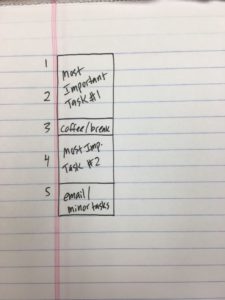How to Rescue a Half-Wasted Day

Train-wreck mornings are a universal human experience.
You had big plans, but now it’s early afternoon and you’ve accomplished virtually nothing. Maybe it’s your fault, maybe it’s not, but it doesn’t really matter at the moment. What matters is that half your day is gone, and you are not a happy camper.
At this point, productivity ninjas and average folks part ways.
The average person thinks, “Ugh, this day is shot. I can’t believe I wasted all that time. Well, hopefully tomorrow goes better.”
The productivity ninja thinks, “This day is not going as planned, and later, I’m going to figure out what happened. But right now, I’ve got half a day to turn into solid gold. Let’s get to work.”
A half-wasted day is disappointing, but it’s also an opportunity to separate yourself from the pack. Here’s a 10-minute approach to turning things around.
1. Focus your attention on the present moment
First, take a moment to let go of whatever happened to the first half of your day. Maybe it was your fault (you spent all morning watching cat videos on YouTube) and maybe it wasn’t (a high-maintenance client’s “emergency” gobbled up your morning), but now is not the time for analysis—it’s the time for action.
The past is past, and you are here, now. Focus your attention on this moment’s most important question: “How can I best use the time that remains?” (Come to think of it, that’s one of life’s most important questions. But I digress.)
Later, you’ll look at what turned your morning upside down. But for now, let go of frustration and get your head right. You’ve got a plan to make.
2. Make a new plan, Stan
Look at your original plan you made for today, whether it was a time-blocked schedule, a to-do list, your Google calendar, or just a mental list. Let’s say you’d planned to accomplish X, Y, and Z today, and you can immediately tell that there’s no longer time for all three of these tasks. It’s time to triage.
- Identify Most Important Tasks. Is there anything that must get done today—i.e. something very bad will happen if you don’t create a certain outcome by the end of the day? If so, it’s a Most Important Task, and an urgent one, too. Make a note of it. If not, identify what is most important on your list—the one or two tasks that will contribute the most to your long-term goals. Don’t exceed three Most Important Tasks.
- Assess your schedule. How much discretionary time do you have left today? If the answer is “none” or “almost none,” consider rescheduling an upcoming commitment for another day. Ditch a meeting if you have to. But make sure you can get at least one Most Important Task done today.
- Get fine-grained. When you’re in a foul, unproductive mood (as you’re likely to be when half your day has vanished before your very eyes), it’s even more important to break tasks down into bite-sized chunks. If any of your three Most Important Tasks are too vague and unwieldy, break them down. I like to use an Excel spreadsheet with one task per row, but a piece of lined paper works just as well. For each task, ask yourself, “What does ‘done’ look like? What steps need to happen, and in what order?”
- Write a new schedule. Take out a blank sheet of paper and draw a simple time grid (see picture). Assign your Most Important Tasks to specific times, filling any remaining time with less important tasks. Again, adjust your expectations from your original plan. If you accomplish one Most Important Task today, your day will have been a success.

3. Manage your environment
Now’s not the time for mucking around in a distracting environment. If you need a change of place, make it so. Get out of the house and take your laptop to a coffee shop or the local library. If you can’t really leave your office, at least shut the door and affix a post-it note: “Please don’t disturb—deep concentration in progress.”
Changing your environment can help you draw a mental line in the sand between the unproductive day you’ve had so far and the astonishing recovery you are about to display.
4. Reflect and learn
As soon as possible (this evening, ideally), find 5-10 minutes to journal about your experience.
- What sabotaged your morning?
- How did you bounce back?
- If the situation was preventable, how could you prevent it next time?
In our personal development quest, we can’t ignore the fact that a lot of what happens in our lives is simply outside our control. Bad days are unavoidable, and everyone gets their share. But we can control how we respond to bad days, and with practice, we can often turn them around and snatch victory from the jaws of defeat.
Photo by StartupStockPhotos